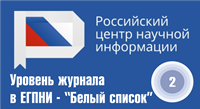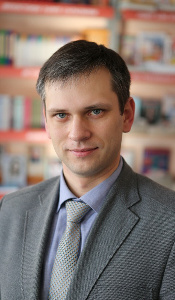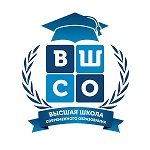ОБНОВЛЕНИЕ СОЦИОКУЛЬТУРНОГО АСПЕКТА СОДЕРЖАНИЯ ВЫСШЕГО ОБРАЗОВАНИЯ
Аннотация
Введение. В статье анализируется проблема социокультурной обусловленности содержания образования, рассматривается необходимость его обогащения гуманистическими социокультурными ценностями, востребованными в профессиональной деятельности выпускника вуза в условиях меняющегося мира.
Цель статьи заключается в теоретико-методологическом осмыслении мировоззренческой сущности социокультурного дискурса и его определяющей роли в обновлении содержания образования как необходимого условия формирования компетентного специалиста.
Задачи: анализ проблемы обновления содержания образования в контексте современных концепций гуманизации; определение сущности и структуры социокультурного аспекта содержания образования в профессиональной подготовке выпускника современного вуза; презентация условий обновления социокультурного аспекта содержания образования в деятельности преподавателя вуза.
Методология. Для достижения поставленной цели рассматривается концепция гуманизации образования, использующая методологический аппарат социальной философии, антропологии, культурологии и указывающая на возрастающую роль ценностного аспекта в содержании образования.
Результаты. Новизна исследования заключается в определении вектора обновления содержания образования, актуальность социокультурного аспекта которого впервые проанализирована в контексте взаимосвязи современных теорий глобального гуманизма, универсального эволюционизма и постнеклассической рациональности. Раскрыта мировоззренческая сущность социокультурного аспекта содержания образования, обновление которого востребовано в подготовке выпускников всех направлений и профилей, включая социогуманитарный и естественно-научный. В контексте культурологической концепции содержания образования предложена структура его социокультурного аспекта и пути обновления. Практическую значимость составляют обозначенные в исследовании условия обновления содержания образования, особое место среди которых принадлежит способности преподавателя к рефлексии его скрытого компонента как значимого канала трансляции социокультурных гуманистических ценностей.
Выводы. Образование, отвечающее социокультурным вызовам изменяющегося мира обновлением своего содержания, служит показателем качества профессиональной подготовки в вузе, обеспечивает формирование социокультурно компетентного специалиста, способного к разрешению противоречий современного мира и готового к поддержанию его устойчивого развития.
Скачивания
Литература
Cписок литературы
Адамский А.И., Асмолов А.Г., Архангельский А.Н. Зицер Д., Ковалева Т., Лукша П. О., Собкин В. С., Фрумин И. Д., Хилтунен Е., Реморенко И. М., Волков С., Ушакова Е., Шперх А., Эпштейн М. Манифест «Гуманистическая педагогика: ХХI век // Вестник образования. 2015. № 10. С. 1-17.
Бенин В.Л. Гуманистическая педагогика и тренды современного российского социума // Сибирский педагогический журнал. 2017. № 4. С. 131-136.
Вербицкий А.А. Новые грани вечной проблемы. Об образовании в контексте и вне его // Высшее образование сегодня. 2017. № 8. С. 6-13.
Зеер Э.Ф. Личностно-развивающее профессиональное образование: монография. Екатеринбург: Издательство РГППУ, 2006. 169 с.
Касаткин П.И., Силантьева М.В. Антропологический аспект глобальных моделей образования: поиски и решения // Полис. Политические исследования. 2017. № 6. С. 137-149. https://doi.org/10.17976/jpps/2017.06.10
Краевский В.В. Науки об образовании и наука об образовании (методологические проблемы современной педагогики) // Вопросы философии. 2009. № 3. С. 77-82.
Моисеев Н.Н. Восхождение к разуму. Лекции по универсальному эволюционизму и его приложениям. М.: ИздАТ, 1993. 174 с.
Степин В.С. Типы научной рациональности и синергетическая парадигма // Сложность. Разум. Постнеклассика. 2013. № 4. С. 45-59.
Шишлова Е.Э. Обновление содержания высшего образования в контексте современных социокультурных трендов // Высшее образование в России. 2021. Т. 30. № 6. С. 70-79. https://doi.org/10.31992/0869-3617-2021-30-6-70-79
Шишлова Е.Э., Курицын И.А. Скрытое содержание профессионального языкового образования в социокультурном измерении // Интеграция образования. 2017. Т. 21. № 4. С. 709–722. https://doi.org/10.15507/1991-9468.089.021.201704.709-722
Шишлова Е.Э. Социокультурная компетентность как показатель качества профессиональной подготовки специалиста // Высшее образование в России. 2020. Т. 29. № 5. С. 95-102. https://doi.org/10.31992/0869-3617-2020-29-5-95-102
Anužienė I. The structure of socio-cultural competence (self) development. Profesinis rengimas: tyrimai ir realijos, 2015, no. 26, pp. 94-105. https://www.ceeol.com/search/article-detail?id=526889 (accessed May 10, 2023).
Curry L.,Wergin John F. Educating Professionals: Responding to New Expectations for Competence and Accountability. Jossey- Bass, San Francisco, 1993. 379 p.
Ibrahim F.A., Heuer J.R. Cultural and Social Justice Counseling. Springer International Publishing, Switzerland, 2016. 256 р.
Liendo, P. J. A pragmatic approach to teaching intercultural competence to trainee teachers and translators. Latin American Journal of Content and Language Integrated Learning, 2012, vol. 5, no. 2, pp. 57-72.
Sewell Jr., William H. The logic of history. Social theory and social transformation. University of Chicago «University Of Chicago Press», Chicago, 2005. 376 р.
References
Adamskiy A. I., Asmolov A. G., Arkhangel’skiy A. N., Zitser D., Kovaleva T., Luksha P. O., Sobkin V. S., Frumin I. D., Khiltunen E., Remorenko I. M., Volkov S., Ushakova E., Shperkh A., Epshteyn M. Bulletin of Education, 2015, no. 10, pp. 1-17.
Benin V.L. Siberian Pedagogical Journal, 2017, no. 4, pp. 131-136.
Verbitskiy A.A. Higher education today, 2017, no. 8, pp. 6-13.
Zeer E.F. Lichnostno-razvivayushchee professional’noe obrazovanie: monografiya [Personally developing professional education: a monograph]. Yekaterinburg: Publishing House of the Russian State Pedagogical University, 169 p.
Kasatkin P.I., Silant’eva M.V. Polis. Political Studies, 2017, no. 6, pp. 137-149.
Kraevskiy V.V. Problems of Philosophy, 2009, no. 3, pp. 77-82.
Moiseev N.N. Voskhozhdenie k razumu. Lektsii po universal’nomu evolyutsionizmu i ego prilozheniyam [Ascent to the Mind. Lectures on universal evolutionism and its applications]. Moscow: Publishing House, 1993, 174 р.
Stepin V.S. Complexity. Mind. Postclassical, 2013, no. 4, pp. 45-59.
Shishlova E.E. Higher Education in Russia, 2021, vol. 30, no. 6, pp. 70-79, https://doi.org/10.31992/0869-3617-2021-30-6-70-79
Shishlova E.E., Kuritsyn I.A. Integration of Education, 2017, vol. 21, no. 4, pp. 709–722.
Shishlova E.E. Higher Education in Russia, 2020 vol. 29, no. 5, pp. 95-102. https://doi.org/10.31992/0869-3617-2020-29-5-95-102
Anužienė I. The structure of socio-cultural competence (self) development. Profesinis rengimas: tyrimai ir realijos, 2015, no. 26, pp. 94-105. https://www.ceeol.com/search/article-detail?id=526889 (accessed May 10, 2023).
Curry L., Wergin John F. Educating Professionals: Responding to New Expectations for Competence and Accountability. Jossey- Bass, San Francisco, 1993, 379 p.
Ibrahim F.A., Heuer J.R. Cultural and Social Justice Counseling. Springer International Publishing, Switzerland, 2016, 256 р.
Liendo, P. J. A pragmatic approach to teaching intercultural competence to trainee teachers and translators. Latin American Journal of Content and Language Integrated Learning, 2012, vol. 5, no. 2, pp. 57-72.
Sewell Jr., William H. The logic of history. Social theory and social transformation. University of Chicago «University Of Chicago Press», Chicago, 2005, 376 р.
Просмотров аннотации: 170
Copyright (c) 2023 Ekaterina E. Shishlova

Это произведение доступно по лицензии Creative Commons «Attribution-NonCommercial-NoDerivatives» («Атрибуция — Некоммерческое использование — Без производных произведений») 4.0 Всемирная.





































